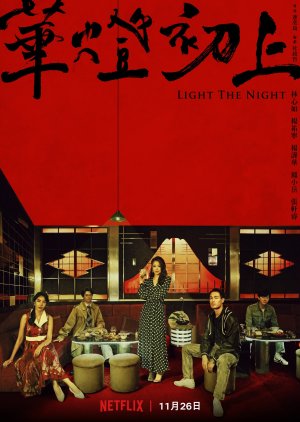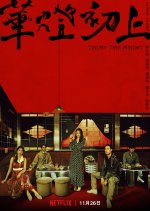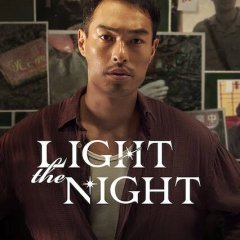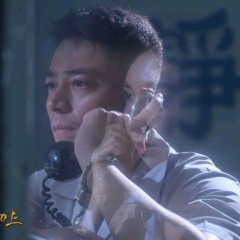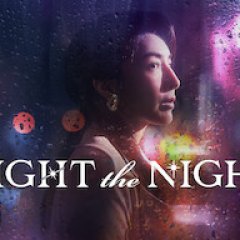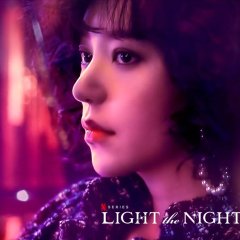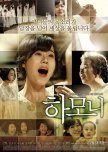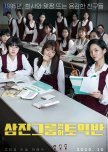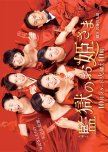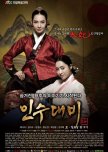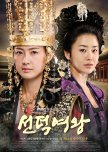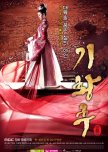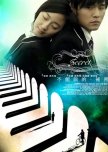In the red-light district of 1980s Taipei, women at a popular Japanese nightclub navigate jealousy, heartbreak, friendship, love, and betrayal. (Source: Netflix) Edit Translation
- English
- 中文(台灣)
- Ελληνικά
- Čeština
- Native Title: 華燈初上
- Also Known As: Light the Night Season 1 , Blue Hour , Hikari Light the Night , Hua Deng Chu Shang Di Yi Ji , 华灯初上 第一季
- Screenwriter: Du Zheng Zhe
- Director: Lian Yi Qi
- Genres: Thriller, Romance, Life, Drama
Where to Watch Light the Night
Subscription (sub)
Cast & Credits
- Ruby LinLuo Yu Nong / "Rose"Main Role
- Tony YangPan Wen ChengMain Role
- Cheryl YangSu Qing Yi / SuMain Role
- Rhydian VaughanJiang HanMain Role
- Derek ChangHe Yu EnMain Role
- Puff KuoWang Ai Lian / AikoMain Role
Reviews
Addictive murder mystery period drama with complex characters
This show had me hooked from the beginning! It had so many of my favorite TV elements: a slow reveal of characters' complex backstories, a murder mystery, glamorous period costumes, and a variety of badass female characters. Also, compared to Taiwan's normal campy, cutesy TV fare (which I do love, to be clear), Light the Night is a huge step up in production quality and story.The show revolves around Rose and Sue, two best friends and house mothers of a 1980s Taipei nightclub. As the episodes unfold, we learn about each of the supporting characters and the drama leading up to the pilot episode's murder. We don't learn the murder victim's identity until the very end, setting us up for Season 2 to investigate the murderer's identity.
I would highly recommend watching this show not just once but multiple times; it's definitely the type of show where you'll pick up subtle details during a rewatch. An artfully crafted story, superbly acted, scored, and production designed, I can't wait for Season 2!
Was this review helpful to you?

This review may contain spoilers
Light the Night is a mature drama with a superb cast. The acting was phenomenal, especially from the two lead actresses, whose relationship is the focal point of the drama. The betrayals feel intense, and their complicated feelings about each other are well-portrayed. Ruby Lin’s camera presence is strong and captivating. Yang Jinyan as Su Qingyi was such a pleasant surprise for me, as someone who’s never heard of her as an actress before. Her Su Qingyi character was so well fleshed out and acted. Such an interesting antagonist from the very start. One of her expository scenes is when she comforts a sobbing Lo Yunung in bed, soothing her broken heart. The viewer can hardly believe the hatred that arises between the two protagonists later in the story. But as much as we can hate Su Qingyi for her betrayal of Lo Yunung, it’s still hard not to pity her — a reserved woman by nature, festering her unrequited love for Chiang Han in silence, while watching her friend’s happiness with him from afar. In the end, I felt that their mutual selfishness and perhaps delusional ignorance of each other’s feelings brought the destruction of the friendship, rather than one being a “villain” antagonizing the other.
One of my qualms about this drama is not the writing or acting — it’s that the drama is written for the male gaze, while on the surface seeming to be a feminist drama that shines a light on sexual assault. (Granted, at writing this review, I don’t actually know who wrote this drama, or what their gender was.) The overwhelming pattern amongst the female characters is that they do stupid things to feel worthy of a man. We see this with Su Qingyi, who epitomizes the love-struck mistress; Aiko, who unwittingly destructs her own life by avenging her heartbroken crush; Yuri, who overlooks the selfishness of her drug-dealing boyfriend and breaks the law for his approval. The show sensationalizes a love triangle in which the two mamasans Qingyi and Yunung love the same man, a charismatic screenwriter named Chiang Han. His disregard for their feelings, selfishness, and misogyny were steeped in his interactions with them. But at the end, he’s almost redeemed. He’s granted a tearful pseudo-repentance, a cinematic shot of him distressing over the last image of his supposed soulmate Yunung, a (what was meant to be) redemptive visit to Chingyi in hospital for attempting suicide after he rejected her… All this felt like a reward for a character who had, all along, been a douchebag. And perhaps, by extension, the show is asking us to forgive and romanticize this handsome playboy who showed a modicum of decency at the very end. All the while, Chiang Han has done the absolute bare minimum for any woman who has cared about him.
If I had to write a counter thesis in support of a pro-feminist reading of this drama, I’d argue that the show actually endorses Lo Yunung and her character arc, in which she “gets over” her tie to Chiang Han. She becomes jaded at the “I’ll do anything for love” sentiment and is the only clearheaded woman in the drama. In fact, at the end, we see her break away from Chiang Han and finally choose her friendship with Chingyi over love. So the question becomes, whose side is the show actually on? The more “feminist” Yunung, who is the hero throughout and played by the beloved Ruby Lin? Or perhaps, by romanticizing the womanizing Chiang Han and showing smart women self destructing over men, is the show unintentionally misogynistic?
Despite my hesitations about its theme and message, I would still recommend Light the Night for anyone looking for an interesting Asian thriller with excellent acting. The drama is has a lot going for it and is overall an entertaining, unique binge!
Was this review helpful to you?
Recent Discussions
| Title | Replies | Views | Latest Post | |
|---|---|---|---|---|
| Themes and Purpose by JXY | 0 | 0 | No discussions yet | |

